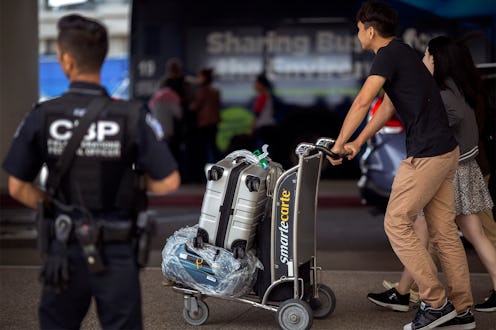News
An Immigrant's Life Savings Was Taken By Border Patrol — And He Can't Get It Back

Customs and Border Protection is in the news again — this time for how it handled a family trying to leave the United States. An Ohio family's entire life savings was taken by Border Patrol. Rustem Kazazi was traveling with nearly $60,000 in his luggage when TSA spotted the money and tipped off customs officers at the airport.
CBP then confiscated the money, but did not accuse the 64-year-old of a crime. The money was seized in October, and the family still has not gotten its money back — or even seen an official criminal charge explaining why it was taken. A spokesperson for the CBP tells Bustle, “Per policy, CBP does not comment on pending litigation.”
Lawyers for the family argue that the government needed to "initiate civil forfeiture proceedings or initiate criminal proceedings" or return the property by April 17, a press release from the Institute of Justice shows. The lawyers argue that's according to the The Civil Asset Forfeiture Reform Act of 2000. But nothing has happened so far.
Kazazi, a U.S. citizen born in Albania, was traveling home and planned to build a house for retirement. His lawyers say that he was hoping to avoid international bank transfer fees and was carrying the money in cash instead. Someone leaving the country with that much cash must declare it, but Kazazi was only flying from Cleveland to New Jersey, where he had planned to file that paperwork before leaving for Albania.
One of his Institute for Justice lawyers, Wesley Hottot, said in a statement that it's "disturbing" that federal agents would treat an American like this:
You have the right to travel with cash in America, even when you’re flying internationally. But again, we’re encountering a situation where law enforcement sees somebody with legal cash, assumes they must have done something criminal, and they just take the money. It is disturbing how little respect federal agents show for the civil rights of American citizens.
Customs and Border Protection meanwhile reportedly told the Kazazis that the money was "involved in a smuggling/drug trafficking/money laundering operation." That was in December, and they also said that they had seized just $57,330. Kazazi claimed he had counted the money twice and labeled it. He alleges the government took $58,100.
Now, his lawyers say that the government is looking for an excuse for their actions. The Institute for Justice's statement said that the accusations were false and that the money was made legally — "and they have 13 years of tax documents and bank statements to prove it."
Kazazi's family is also speaking out. “The government harassed my father, stole my family’s money and is now apparently hoping we’ll just forget about it,” Erald Kazazi, Rustem's son, said in a statement. “We’re American citizens, and we came to this country because we believe America is the land of freedom and opportunity. We never imagined the government would treat its own citizens this way.”
This is not the first first case that these attorneys have tried. Their prior two cases resulted in the government returning the money and seized items. One of the two cases, though, continues, accusing the federal agency of breaking the law. In that case a nurse was flying to Nigeria with $41,000 to open a medical clinic. She got the money back only after negative attention was drawn to the case.
Institute for Justice attorney Johanna Talcott argued that this type of problem is all to common. “The Kazazis did nothing wrong and were never charged with a crime," Talcott said in a statement, "but the government still won’t return their money all these months later. This kind of abuse is far too common."